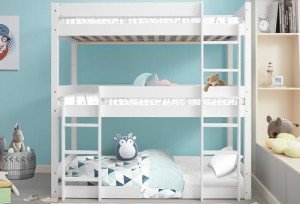20 Trailblazers Lead The Way In Bunk Beds
Exploring Bunk Beds: A Comprehensive Guide
Bunk beds have long been a staple in kids's bed rooms, dorms, and even homes with limited space. Not just do they offer a useful sleeping service, however they likewise produce an enjoyable and creative environment for kids and a great space-saver for adults and households. This article will check out whatever you need to know about bunk beds, from types and materials to security pointers and buying guidance.
Table of Contents
- Types of Bunk Beds
- Standard Bunk Beds
- Loft Beds
- Triple Bunk Beds
- L-Shaped Bunk Beds
- Material Options
- Wood
- Metal
- Safety Considerations
- Buying Guide
- Frequently asked questions
Types of Bunk Beds
Bunk beds can be found in different styles to match various requirements and preferences. Here's a breakdown of the most typical types:
Conventional Bunk Beds
Standard bunks normally include two beds stacked vertically on top of one another. These beds are perfect for siblings sharing a room or for making the most of sleeping space in guest rooms.
Loft Beds
Loft beds stand likewise to traditional bunk beds but do not have a lower sleeping area. Instead, they typically incorporate a desk or seating location beneath, making them a great option for little spaces needing multifunctionality.
Triple Bunk Beds
Triple bunk beds are designed for 3 residents, with beds stacked in a three-tier setup. These are less common however can be an enjoyable solution for large households or slumber parties.
L-Shaped Bunk Beds
With one bed placed horizontally and the other vertically, L-shaped bunk beds are often equipped with extra functions such as desks or storage drawers and can complement corner areas in a room.
Contrast of Bunk Bed Types
Bed Type
Ideal Use
Description
Conventional
Shared bed rooms or guest rooms
2 beds stacked vertically
Loft
Small rooms requiring multi-purpose space
Upper bed with open space below
Triple
Big households or slumber parties
3 beds stacked vertically
L-Shaped
Corner or versatile spaces
A combination of vertical and horizontal beds
Material Options
Bunk beds are produced from various products, with wood and metal being the most typical. Each material has its pros and cons.
Wood
- Sturdiness: Generally robust and can stand up to years of use.
- Visual Appeal: Offers a classic appearance that can blend with various decorations.
- Weight Capacity: Typically tougher; can support heavier weights.
- Downsides: May be more expensive than metal choices and can be susceptible to scratches.
Metal
- Durability: Generally light-weight and simple to move however still strong.
- Modern Design: Often can be found in streamlined styles, making it appealing for modern spaces.
- Cost-Effective: Usually cheaper than wood choices.
- Downsides: Can be cold to the touch in winters and may not have the exact same visual appeal for some buyers.
Security Considerations
When it comes to bunk beds, safety can not be overlooked. Here are key safety ideas to keep in mind:
- Guardrails: Ensure that the top bunk has guardrails on both sides to avoid falls.
- Tough Construction: Check for a strong develop and sturdy materials to hold up against weight and motion.
- Weight Limit: Adhere to the maker's weight limit for both the upper and lower bunks.
- Ladder Design: Choose bunks with a safe, easy-to-climb ladder and prevent any sharp edges or rungs.
- Age Restrictions: Most producers suggest that kids under the age of six ought to not oversleep the upper bunk.
Buying Guide
When looking for bunk beds, think about the list below factors to discover the very best suitable for your requirements:
- Space Availability: Measure the space size and ceiling height, ensuring there is sufficient space for the leading bunk.
- Bed Size: Decide in between twin, complete, or larger sizes based upon your needs and the size of the room.
- Style Preference: Consider the general decor of the bedroom to discover an appropriate design.
- Reduce of Setup: Look for a bunk bed that is straightforward to put together.
- Spending plan: Bunk beds are available in various price varieties, so identify a spending plan before starting your search.
FAQs
1. What is the advised age for children to sleep on the leading bunk?
Children aged six and older are usually suggested to sleep on the leading bunk to reduce the danger of falls.
2. How can I make my bunk bed more secure?
To enhance security, make sure guardrails are appropriately installed and examine that the bed is placed on a flat surface. Additionally, motivate kids to utilize the ladder thoroughly.
3. Can I convert a bunk bed into 2 different beds?
Many bunk beds are created to be convertible. Examine Bunk Bed Sale donnbrandwein.top for convertibility functions.
4. What accessories are available for bunk beds?
Typical devices include beddings, storage drawers, staircases instead of ladders, and tented canopies for an enjoyable visual appeal.
5. How do I maintain my bunk bed?
Routine look for loose screws or structural stability can help make sure security. Dust the bed regularly and tidy spills without delay to keep the products in good condition.
Bunk beds are flexible and a space-efficient solution for various living situations, from kids's rooms to guest lodgings. With many designs and products available, prospective purchasers have a wealth of options to think about, guaranteeing a combination of practicality and looks. By prioritizing security and following the tips laid out in this guide, people can find the ideal bunk bed that suits their space and lifestyle, all while creating a pleasurable sleeping environment.
